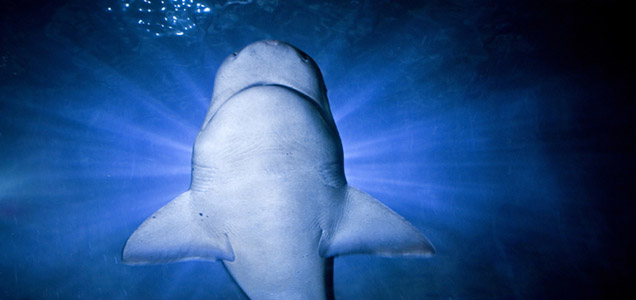There were 53 shark attacks in the United States in 2013, and only two of those attacks resulted in deaths.

Photo courtesy of Aquarium of the Bay
It’s time for sharks to be appreciated and not feared. Sharks are such a key part of the oceanic food chain that if some species were to go extinct it could throw off the ocean’s balance. And many sharks are basically unchanged since the time of the dinosaurs. Put simply, there are many more interesting things about these animals than the fact that they bite humans on very rare occasions.
To learn more about these magnificent fish, I spoke to Michael Grassmann, a senior biologist at Aquarium of the Bay. Grassmann has worked with 30 different species of sharks in his last 11 years in the field. He has even swum with nothing between him and sharks except for a wetsuit.
What is it like to work with sharks?
Michael: It’s an amazing experience. I have a lot of respect for these animals and I feel pretty privileged that I get to work with them on a daily basis.
What’s the most memorable experience you have had while working with sharks?
Michael: I remember the first time I was in the water with a large shark. It’s difficult to articulate how it feels to be that close to a large animal. Especially in the back of your mind you know that this animal could potentially cause you harm, but the longer you work with them the more you are able to establish a sort of a sixth sense. It’s just like working with any other animal.
What is the biggest myth about sharks?
Michael: The biggest myth of all is that people believe that there is any probability at all of them getting attacked by a shark. The likelihood of that happening is astronomically small. You have a better chance of being struck by lightning or killed by a vending machine falling on top of you than being eaten by a shark.
Do you have a favorite type of shark?
Michael: Yeah, I think whale sharks are incredible animals. I’ve been within touching distance of one in the wild and was amazed by its sheer size and the fact that they eat plankton. Its one of the biggest fish in the ocean but it eats some of the smallest fish.
Why are sharks so important for the oceanic food chain?
Michael: Just like any apex predator, they really help to keep the ecosystem in balance. There’s two ways: there’s a cornerstone or keystone species that has a disproportionately larger effect on the ecosystem. So you could have a few large sharks that are considered a keystone species because of the impact they have on the rest of the food chain, and if you remove that you have a huge vacuum that would cause the collapse of the food web. Other sharks, like the broadnose sevengill, have a tremendous effect because they are predators for other species, which helps keep the whole ecosystem in balance and in check.
What is something interesting about sharks at the Aquarium of the Bay?
Michael: I think what’s really interesting about sharks in general is the way that they have evolved over time. But the broadnose sevengills are not only the largest shark species found in the Bay, growing up to 10 feet long and weighing in excess of 300 pounds, but they are one of the oldest living shark species, belonging to a family of sharks that have been in the fossil record for over 160 million years. These animals have remained unchanged since the time the dinosaurs walked the planet.
What species of sharks live in the Bay?
Michael: We have the broadnose sevengill, the tope or soupfin shark, spiny dogfish, leopard shark and two species of smooth hound shark. Most of these sharks don’t grow bigger than about three or four feet. The sevengill shark is one of the largest resident sharks that we have in the Bay.
If you are itching to see these beautiful animals in action, but don’t want to hop in the water right away, you can visit Aquarium of the Bay and walk alongside sharks in the Aquarium’s Under the Bay tunnel exhibit. From August 1 to 10, you can join Aquarium of the Bay for Shark Week, where you can learn all about this magnificent animal. Learn more at www.aquariumofthebay.org.
Chandler Bullock is a Syracuse University student interning with Aquarium of the Bay.

